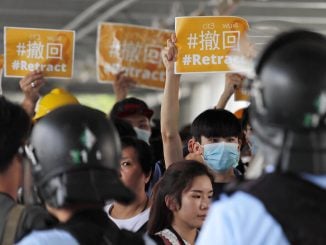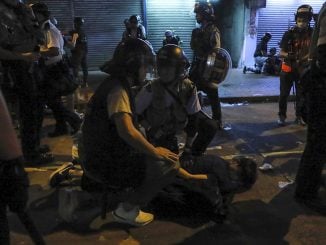HONG KONG — Hong Kong authorities arrested media tycoon Jimmy Lai on Monday, broadening their enforcement of a new national security law and stoking fears of a crackdown on the semi-autonomous region’s free press. Police were seen carting away boxes of what they said was evidence at Lai’s pro-democracy Next Digital headquarters.
In the evening, police arrested pro-democracy activist Agnes Chow Ting on charges of inciting secession under the same law, according to tweets by fellow activist Nathan Law, who left Hong Kong for Britain soon after the law took effect. An earlier post on Chow’s official Facebook page said police had arrived at her home, and her lawyers were rushing to the scene. A separate post later confirmed that she had been taken away by police.
Two days after Chinese and Hong Kong officials shrugged off sanctions imposed on them by the U.S., the moves showed China’s determination to enforce the new law and curb dissent in the semi-autonomous city after months of massive pro-democracy demonstrations last year.
The arrest of Lai, two of his sons and several company officers and the search of Next Digital marked the first time the law was used against news media. Next Digital operates Apple Daily, a pro-democracy tabloid that often condemns China’s Communist Party-led government.
“Raiding a news institution is a severe attack on press freedom and should not be tolerated in a civilized society,” Next Digital said in a statement. “Hong Kong’s press freedom is now hanging by a thread, but our staff will remain fully committed to our duty to defend the freedom of the press.”
Apple Daily’s popularity stems from its celebrity news and flamboyant stories, but it is also known for investigative reporting and breaking news coverage. It has frequently urged readers to take part in pro-democracy protests.
On July 1, it condemned the new national security law on its front page, calling it “the final nail in the coffin” for the “one country, two systems” framework under which the former British colony has been able to enjoy much greater civil liberties than in mainland China since its return to Chinese rule in 1997.
The British government condemned Lai’s arrest, saying authorities are using the new law to quash dissent.
“This is further evidence that the national security law is being used as a pretext to silence opposition,” Prime Minister Boris Johnson’s spokesman, James Slack, said Monday.
U.S. Secretary of State Mike Pompeo said in a tweet that he was “deeply troubled” by reports of Lai’s arrest and that it was proof the Chinese Communist Party has “eviscerated Hong Kong’s freedoms and eroded the rights of its people.”
The arrests of Lai and Chow came on the same day Beijing announced sanctions on 11 Americans, including six members of Congress, in retaliation for U.S. sanctions on Hong Kong and mainland officials over Hong Kong policy.
Mark Simon, a Next Digital executive and Lai’s aide, said Lai was charged with collusion with foreign powers.
Hong Kong police said they arrested at least 10 people between the ages of 23 and 72 on suspicion of violating the security law and other offenses. They did not release the names of those arrested or provide further details of the charges.
Following Lai’s arrest, about 200 police raided Next Digital’s headquarters, cordoning off the area, searching desks and at times getting into heated exchanges with staff. What police were looking for in the building wasn’t clear, although they later said they took away 25 boxes of evidence for processing.
Lai, who was arrested at his mansion in Kowloon in the morning, was also brought to the headquarters of Next Digital, where he remained for about two and a half hours before police took him away in a car.
“We are completely shocked by what’s happening now, with the arrest and followed by the ongoing raid inside the headquarters of Next Digital,” said Chris Yeung, chairman of the Hong Kong Journalists Association.
“With the passage of the national security law and the really tough powers given to the police in their operations, we have seen now what we call ‘white terror’ become a reality, which will affect media organizations and journalists’ reporting.”
Police only allowed journalists from select media to cover the raid from inside the cordoned-off area. They barred public broadcaster RTHK and foreign outlets including The Associated Press, saying only larger local media that had not obstructed or posed a threat to police in the past could enter.
Senior Superintendent Steve Li said the arrests were not politically motivated.
Bruce Lui, a senior lecturer in Hong Kong Baptist University’s journalism department, said authorities are making an example of Apple Daily under the new law.
“They’re used as an example to terrify others … of what can happen if you don’t obey or if you go too far,” Lui said. “I think other media may make a judgment to censor themselves.”
The reasons for the charge against Lai weren’t clear.
In May, shortly after Beijing announced its intention to pass the national security law for Hong Kong, Lai condemned the legislation in a series of tweets. The state-owned newspaper Global Times called the tweets “evidence of subversion.”
Lai also wrote an op-ed in The New York Times in May stating that China was repressing Hong Kong with the legislation.
“I have always thought I might one day be sent to jail for my publications or for my calls for democracy in Hong Kong,” Lai wrote. “But for a few tweets, and because they are said to threaten the national security of mighty China? That’s a new one, even for me.”
Lai also faces charges of joining an unauthorized vigil June 4 marking Beijing’s crackdown on pro-democracy protesters in Tiananmen Square in 1989.
Last year, Lai met U.S. Vice President Mike Pence and Pompeo at the White House to discuss a controversial bill — since withdrawn — that would have allowed criminal suspects in Hong Kong to be sent to mainland China for trial.
The security law, which took effect June 30, outlaws secessionist, subversive and terrorist acts, as well as collusion with foreign forces in the city’s internal affairs. The maximum punishment for serious offenders is life imprisonment.


